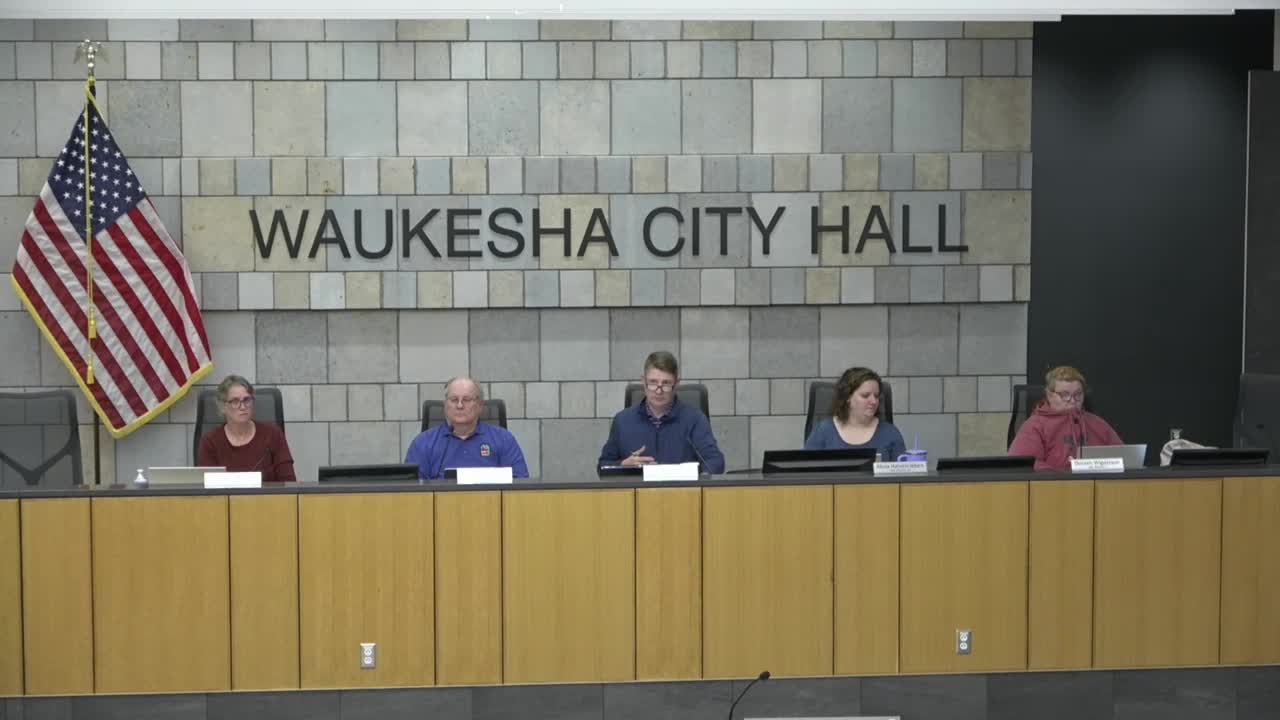Finance Committee reviews 2026 operating budget; city tax rate projected to fall for operating levy
Get AI-powered insights, summaries, and transcripts
Subscribe
Summary
City officials reviewed the proposed 2026 operating (general) fund, discussed levy-limit constraints and a recently adopted refuse fee that reduces the operating levy. Committee members pressed staff for further detail on net new construction projections, total tax bill comparisons and contingency planning.
WAUKESHA, Wis. — Waukesha City officials on Tuesday opened a review of the proposed 2026 operating budget, highlighting constraints created by state levy limits, a recent refuse/recycling special charge and a notable rise in assessed value that together reduce the city's operating tax rate while leaving long-term structural pressures.
City Administrator Tony Brown told the Finance Committee the meeting would focus on the general fund, "the operating budget," and not the capital fund, which he described as "for larger, long term, assets." He and Finance staff outlined revenue and expenditure trends, five-year projections and steps the city has already taken to reduce prior shortfalls.
Why it matters: the operating levy is constrained by state levy-limit rules based on net new construction and other formulas. That constraint means costs are rising faster than the property-tax revenue the city may levy without voter approval, so staff have used a mix of personnel and service adjustments plus a new refuse special charge to relieve pressure on the general fund.
Key points discussed
- Levy limits and assessed value: Brown and staff explained the distinction between the operating (general) fund and capital/debt service funds and warned that levy limits apply equally to all communities under state law regardless of available development land. Finance staff said the city's total assessed value for the tax roll is roughly $10.6 billion, an increase staff described as about $1.5 billion (roughly 17%) from 2025.
- Refuse/recycling special charge: committee members and staff discussed the special charge that shifts refuse and recycling costs out of the general fund. Finance staff said removal of that levy amount is required by state statute and that the special charge has a net impact of about $1.2 million on the budget.
- Operating levy and tax-rate impact: staff said the operating portion of the tax rate would decline from about $5.72 to $4.78 per $1,000 of assessed value (a decrease of roughly $0.94). Finance staff reported the operating levy would fall by roughly $964,000. On a house assessed at $350,000, staff projected an approximate $86.86 reduction in the city portion of the tax bill; the refuse special charge would apply separately to those households.
- Prior and projected shortfalls: staff reviewed actions in 2025 that reduced a prior shortfall by about $2.5 million through service reductions and personnel changes. With the refuse charge and other steps, staff said the five-year forecast shows a smaller projected shortfall by 2029 (from about $5.1 million to about $3.7 million), though staff cautioned projections depend on assumptions about future revenues and costs.
- Revenue drivers and uncertainty: Brown highlighted that property taxes are about 62% of the $84 million budget and that, under current levy limit rules, the typical annual allowable increase tied to net new construction and CPI is small (staff estimated net new construction adds roughly 1.2% on average). The city also benefits in the near term from a larger-than-expected assessed-value increase, but staff warned some state programs (including expenditure restraint) can vary year to year and should not be assumed permanent.
Committee requests and next steps
Committee members asked staff to: present a combined operating-plus-capital comparison at the next meeting so the public can see the full tax-bill picture; provide multi-year net-new-construction projections (with assumptions) to show how the levy limit will affect revenue going forward; and clarify any rounding discrepancies on presentation slides versus the printed budget. Staff said they can provide assessed-value and per-capita comparisons with nearby communities and will bring debt-service detail and a full tax-bill comparison at the next meeting.
Formal action
The committee approved the minutes of the Sept. 30 meeting by unanimous consent earlier in the session; no other formal votes were taken during the budget presentations.
What the committee did not decide
No ordinance, levy adoption or budget adoption vote occurred at the meeting. Staff emphasized that the meeting is a review stage: the finance committee is expected to recommend a proposed budget to the full Common Council at a later date, and the council will consider adoption following required public hearings and statutory notice.
Sources and attribution
The account above is based on statements and budget slides presented by City Administrator Tony Brown and finance staff during the Finance Committee meeting. Committee members who asked questions are identified in the transcript as Alderman Lemke, Alderman Slavin, Alderman Manion, Alderman Wiggerson and others. Quotations in this article are attributed to Brown and finance staff as quoted in the public proceedings.
Looking ahead
Staff said the committee will reconvene later in October to hear remaining departments, discuss internal-service funds and consider whether any finance-committee amendments are appropriate before recommending a proposed budget to the Common Council.
